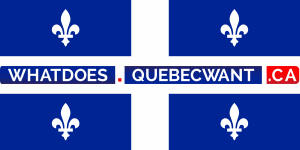Frequently Asked Questions
What is this site about?
Canada is said to be composed of two solitudes: the people of Québec, the majority of whom speak French and the rest of Canada.
Both solitudes can’t seem to understand each other, leading to a lot of confusion, allowing people with certain agenda to take advantage and use propaganda to further their own goals.
In many cases, it’s the Nationalists on either side who are trying to mount Canadians from either sides against each other.
One of the main attacks against Quebec in the 90s was the question:
“What does Quebec want?”
Which was implying that Québec was an insubordinate clueless child rebelling against just and fair parents.
I am in the firm belief that Nationalists (both from Québec and from the rest of Canada) cannot be swayed from their position, but I do think that with a little explanation, the vast majority of Canadians can get better information about what’s the problem with Québec.
I am not a Canadian, can I read this site?
Sure, you are welcomed to read it, but most of the articles assume that the reader is already aware of the political and historical context of Canada.
It is my goal to eventually write an “Intro for non-Canadian” page, but it’s not a priority.
What is the ROC?
To people in Québec, both French and English speakers, the ROC is the Rest of Canada or if you prefer, the other 9 provinces and 3 territories.
In short, it divides Canada into two groups: Québec and the ROC.
It is in no way derogatory in the mouth of most Québecers, but I admit that for some nationalists, it can be used as a slang.
In my case, I assure you that it is simply descriptive.
How do I report an error?
I am not 100% sure that everything I write is purely factual.
In some cases, It’s very complicated to separate the facts from the propaganda especially when its propaganda perpetuated officially by the government of Québec or the government of Canada.
But if I make an error, do not hesitate to use the contact form to point it out, but keep in mind that since I research as much as I can my articles before I write them, I will need:
- Actual sources. Not just the blog of a guy who claims to know the truth
- The name of the article to correct
- The exact part of the article where I am wrong
- Your real contact information
I can credit you with the correction if you’d like or keep your contribution anonymous.
Why is this site in English?
The target audience for this blog is Canadians living outside of Québec, not French Canadians from Québec.
I cannot claim to even try to begin to explain to Québecers what the Rest of Canada thinks about us since, well, I’ll live in Québec all of my life.
I do talk to Canadians from outside of Québec, enough to understand their lack of understanding about Québec, but not enough to fully explain their own problems to Québecers.
Maybe one of them will be inspired to write (in French) a similar site to explain their own problems with Québec?
Do you have a glossary of some sort?
Sure, here are some important words:
- Country: A sovereign country, as in, Canada since 1982
- Nation: A group of people who share a common territory, culture and history. Canada is currently composed of two founding nations: The French Canadians (now Quebecers) and the English Canadians (now the Rest of Canada)
- ROC: Rest of Canada: the other provinces and territories of Canada (excluding Québec)
- Lower Canada: The part of the province of Canada which became Québec. The new name for the Nouvelle France.
- Upper Canada: The part of the province of Canada which became Ontario.
- Nouvelle France: In reality, Nouvelle-France was huge and stretched from Québec to Louisiana and encompassed a massive (mainly unsettled) territory. When I talk about Nouvelle-France, I am basically talking about the portions of it which are now in Québec because they held the majority of the population of the Nouvelle-France and are the only really still French portions of it.
- Province of Canada: Union of Upper and Lower Canada between 1840 and 1867.
- Confederation: A country which is a union of semi-sovereign constituent regions (called Provinces in Canada) which delegate some of their powers to a central government
- The Confederation: Basically a synonym for Canada between 1867 and 1982. A confederation in name only.
- Federation: A county which is a union of subordinate regions (called Provinces in Canada) in which a central government delegates some of its power to the regions. Almost the state of Canada between 1867 and 1982.
- Patriotes: with a capital P and an E, its the name of the patriots (with a lower P and without an E) which took arms against the British occupation in 1837
- The British: Generally speaking, the term British means the Great Britain colonial power. It doesn’t generally include the British colonists in Canada but generally includes the people sent by Great Britain to control Canada (such as the British Army).
- The Act of Union (of 1840): The act which unified Upper Canada and Lower Canada into the Province of Canada with the state goal of assimilating the French Canadians and turning them into model British subject. It was complete failure.
